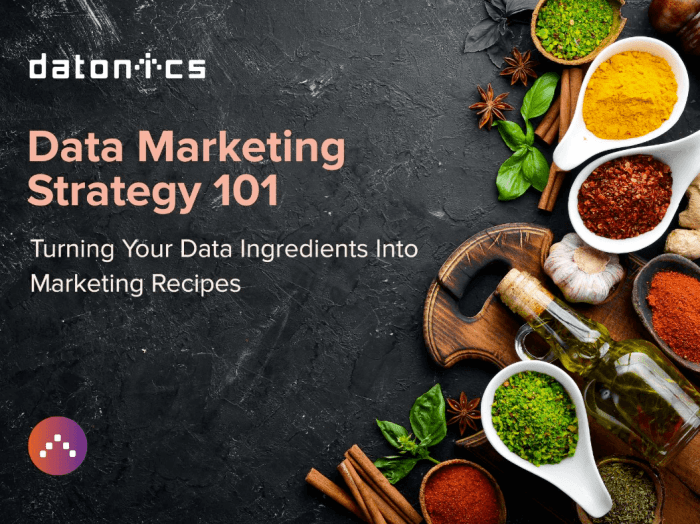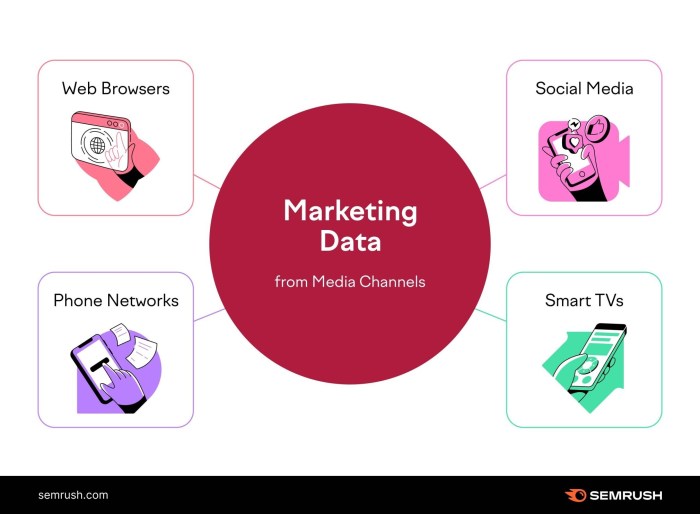Kicking off with Using Data for Marketing, this topic dives into the power of data in shaping effective marketing strategies that resonate with customers on a deeper level. From analyzing customer behavior to personalizing messages, data plays a crucial role in driving successful marketing campaigns. Get ready to explore the world of data-driven marketing with a fresh perspective that will elevate your marketing game to the next level.
Importance of Using Data for Marketing
Utilizing data in marketing strategies is crucial in today’s digital age. Data-driven marketing allows companies to make informed decisions, personalize customer experiences, and ultimately drive better results. By analyzing data, businesses can gain valuable insights into consumer behavior, preferences, and trends, enabling them to create targeted campaigns that resonate with their target audience.
Improved Customer Engagement
Data-driven marketing can greatly enhance customer engagement by delivering more relevant and personalized content. For example, by analyzing customer purchase history and browsing behavior, companies can send tailored recommendations and offers that are more likely to convert. This level of personalization not only increases customer satisfaction but also fosters loyalty and long-term relationships.
Enhancing Marketing Campaigns with Data Analytics
Data analytics play a vital role in optimizing marketing campaigns for maximum impact. By tracking key performance indicators (KPIs) such as conversion rates, click-through rates, and customer acquisition costs, businesses can identify areas for improvement and make data-driven decisions to enhance campaign effectiveness. Through A/B testing, segmentation, and predictive analytics, companies can refine their marketing strategies to reach the right audience with the right message at the right time.
Types of Data Used in Marketing
In marketing efforts, various types of data are utilized to target the right audience effectively and tailor campaigns to meet their needs.
First-Party vs. Third-Party Data
First-party data refers to information collected directly from customers or website visitors, such as email addresses, purchase history, or preferences. On the other hand, third-party data is purchased from external sources and provides insights into a broader audience, including demographics, interests, and online behaviors.
Demographic Data
Demographic data includes information about the characteristics of a population, such as age, gender, income level, education, and location. Marketers use this data to segment their audience and create targeted campaigns that resonate with specific groups.
Behavioral Data
Behavioral data tracks how consumers interact with a brand online, including website visits, clicks, purchases, and social media engagement. By analyzing this data, marketers can understand consumer preferences and tailor their messaging to drive conversions.
Psychographic Data
Psychographic data delves into the attitudes, values, and lifestyle choices of consumers. This type of data helps marketers understand the motivations behind purchasing decisions and create messaging that appeals to consumers on a deeper emotional level.
Implementing Data-Driven Decisions

When it comes to making informed marketing decisions, leveraging data is key for businesses looking to stay ahead of the competition. By analyzing data, businesses can pinpoint trends, preferences, and behaviors of their target audience, allowing them to tailor their marketing strategies effectively.
Utilizing Data for Informed Marketing Decisions
Implementing data-driven decisions in marketing involves the following steps:
- Collect Relevant Data: Gather data from various sources such as customer interactions, website analytics, and social media metrics.
- Analyze Data: Use tools and techniques to analyze the collected data and identify patterns and trends that can inform marketing strategies.
- Set Objectives: Define clear marketing objectives based on the insights gained from data analysis.
- Implement Strategies: Develop and implement marketing strategies that align with the data-driven objectives set earlier.
- Monitor and Adjust: Continuously monitor the performance of marketing campaigns, analyze results, and make adjustments based on data feedback.
Successful Marketing Campaigns Driven by Data
Examples of successful marketing campaigns powered by data analysis include:
- Amazon’s personalized product recommendations based on user browsing and purchase history.
- Sports apparel brands using customer data to target specific demographics with tailored promotions.
- Spotify’s algorithm-driven playlists that curate music based on user listening habits.
Importance of A/B Testing and Data Interpretation
A/B testing and data interpretation play a crucial role in refining marketing strategies by:
- Testing Variations: A/B testing allows businesses to compare different versions of marketing materials to determine which one performs better with the audience.
- Optimizing Campaigns: Data interpretation helps businesses understand customer behavior and preferences, enabling them to optimize marketing campaigns for better results.
- Iterative Improvement: By continuously testing, interpreting data, and making adjustments, businesses can iteratively improve their marketing strategies for maximum effectiveness.
Personalization and Targeting through Data: Using Data For Marketing
Personalization and targeting through data are essential aspects of modern marketing strategies. By utilizing data effectively, marketers can tailor their messages to specific target audiences, resulting in more personalized and relevant marketing campaigns.
Benefits of Targeted Marketing, Using Data for Marketing
- Increased conversion rates: Targeted marketing ensures that messages reach the right audience, leading to higher conversion rates and improved ROI.
- Enhanced customer engagement: Personalized messages resonate more with customers, leading to increased engagement and loyalty.
- Cost-effectiveness: By targeting specific audiences, marketers can optimize their marketing spend and maximize the impact of their campaigns.
Ethical Considerations in Personalized Marketing
- Respect customer privacy: Marketers must ensure that they are transparent about the data they collect and use for personalized marketing, respecting customer privacy and preferences.
- Obtain consent: It is important to obtain explicit consent from customers before using their data for personalized marketing purposes, ensuring compliance with data protection regulations.
- Avoid data misuse: Marketers should use customer data responsibly and avoid any misuse or unethical practices that could harm customer trust and brand reputation.
Tools and Technologies for Data-Driven Marketing

Data-driven marketing relies heavily on various tools and technologies to collect, analyze, and utilize data effectively for targeted campaigns.
Popular Tools and Technologies for Data Collection and Analysis
- Google Analytics: A widely-used tool for tracking website traffic, user behavior, and conversions.
- Customer Data Platforms (CDPs): Platforms that collect and unify customer data from various sources for a comprehensive view.
- Marketing Automation Software: Helps automate repetitive marketing tasks and workflows based on data insights.
- Data Visualization Tools: Tools like Tableau and Power BI help visualize complex data for easier analysis and decision-making.
Comparison of Different Customer Relationship Management (CRM) Platforms
- Salesforce: A robust CRM platform known for its customization options and scalability.
- HubSpot: Offers an all-in-one solution for marketing, sales, and customer service with a user-friendly interface.
- Zoho CRM: Provides affordable CRM solutions with a wide range of features for small to medium-sized businesses.
- Microsoft Dynamics 365: Integrates seamlessly with other Microsoft products for a comprehensive business solution.
Role of Artificial Intelligence and Machine Learning in Optimizing Marketing Campaigns
Artificial intelligence (AI) and machine learning play a crucial role in data-driven marketing by analyzing large datasets to identify patterns, predict customer behavior, and optimize marketing strategies. AI-powered tools like predictive analytics and recommendation engines help businesses personalize their marketing efforts and enhance customer experiences.